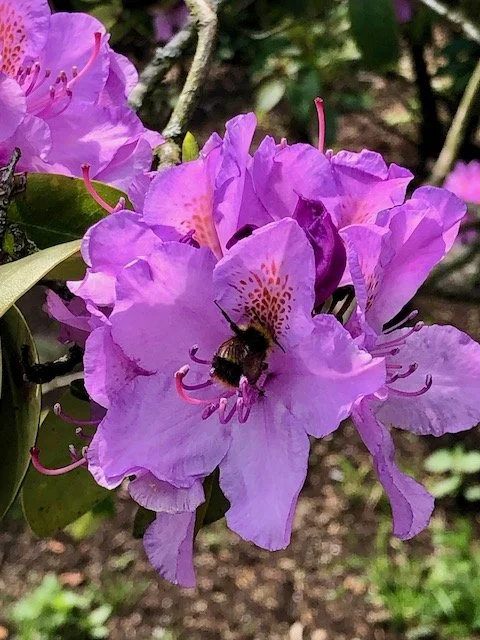Writing From The Inside Out 2022 Week 20 Prompt
based on Mary Ursula Bethell’s Time
Read the poem
Do your own reflection on it, noting what it inspires in you
Feel free to use your own reflection as your prompt or…
Use the selection of prompts below the poem
Pick one that inspires you and write (feel free to use only one or write several poems using different prompts) or…
Don’t use any of the provided prompts and follow your inspiration from wherever it comes
Time
‘Established’ is a good word, much used in garden books,
‘The plant, when established’…
Oh, become established quickly, quickly, garden!
For I am fugitive, I am very fugitive—
Those that come after me will gather these roses,
And watch, as I do now, the white wistaria
Burst, in the sunshine, from its pale green sheath.
Planned. Planted. Established. Then neglected,
Till at last the loiterer by the gate will wonder
At the old old cottage, the old wooden cottage,
And say, ‘One might build here, the view is glorious; This must’ve been a pretty garden once.
Mary Ursula Bethell
https://en.wikipedia.org/wiki/Ursula_Bethell
Please join Writing From The Inside Out by attending the read-around sessions on Friday afternoons. It’s free, fun, a great way to share, and reading a poem is optional. If you have not registered, click the button below; and if you have registered, you do not need to register again, simply use the link sent to you in your confirmation email. Register Here:
Next Read Around is May 20, 2022
My Thoughts
Mary Ursula Bethell’s poem, Time, starts out with a line that could serve as a strategy for writing poetry. Find “a good word” and see where it will take you. You might find that word in some activity you love to do as Bethell did with gardening and the word ‘established.’ No matter how diligent we are with our plans and our dreams, some of what we do will never get established: never sprout or it will get trampled or eaten, or die out of neglect or poor conditions or acts of God. Then there are those things that do get “established,” that flourish, sometimes in spite of our neglect. This is especially true when our fugitive self takes over, driving us to make an escape from our lives, sometimes without much thought to what we leave behind. When a plant or a project gets well established, it has the chance to go on even after we are gone. And we don’t know what part of our unplanned legacy might inspire visions in those that come after us: who might see what we saw or who might, with fresh eyes, establish a new mix in the soil we leave behind.
Prompt Menu
Pick up a book and, with eyes closed, open it to some random page and put your finger on the page. Notice what word or phrase it lands on or find a ‘good word’ to the right or left of it. Use that word as your prompt.
Write out a list of ‘good words’ and then pick out a few to use in a poem.
What are you hoping to ‘establish’ at this point in your life? Journal or write a poem about it.
What have you established and what have you neglected? What is thriving with little or no effort on your own part? What pet project or past activity have you let go fallow? Journal or write apome about either of both of those aspects of your life.
Using the garden as a metaphor, Journal or write a poem about the condition of your life as it might be represented in a garden. What does the garden need for your life to thrive?
From what are you a fugitive? What do you try to escape from in your life? Journal are write a poem about it, how you try to escape, and what results.
Imagine someone who comes after you and journal write a poem about what they would see and how they might think about the remains of your garden.
As usual, write about whatever else inspires you from the poem or from life.
